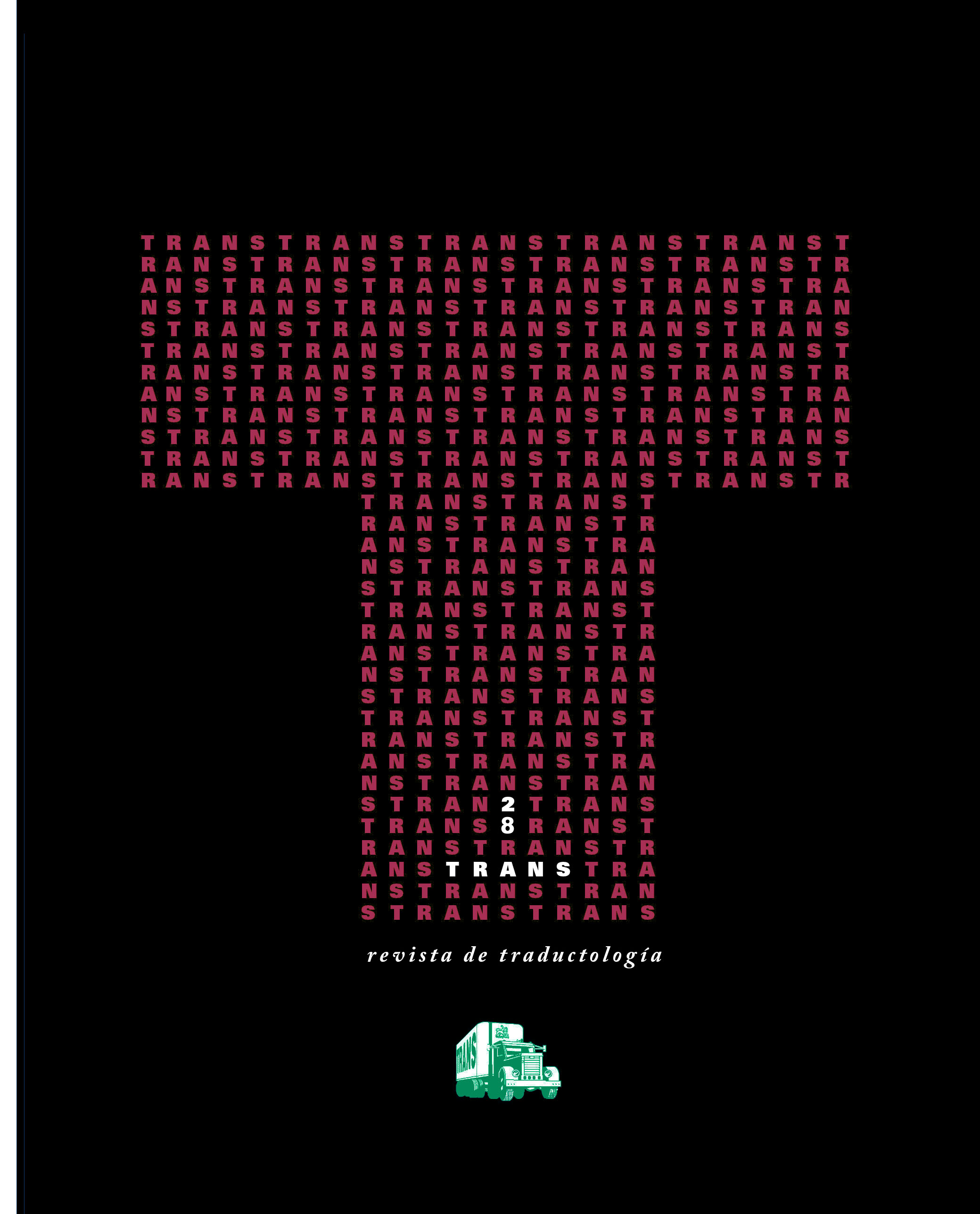Queerness Between the Lines: A Translation and Analysis of Lesbianism in Malinda Lo’s Last Night at the Telegraph Club (2021)
DOI:
https://doi.org/10.24310/trt.28.2024.17772Keywords:
Translation studies, Queer linguistics, Lesbianism, Modes of translation, Literary translationAbstract
Stories of lesbian women have traditionally been silenced through translations, which entails a general lack of adequate language dealing with their sexual identities. On this basis, this research proposal approaches the translation of lesbianism from English into Spanish focusing on the classification and analysis of terminology used in lesbian groups. This analysis also delves into the strategies adopted to either conceal or openly display homosexuality, thus opting for either preserving or disputing the taboo surrounding the LGBTQI+ community. The results reveal a higher percentage of euphemistic and distancing expressions that deem lesbianism a taboo. This, therefore, highlights an evident rejection of lesbian women, which reflects the attitude held towards them both in San Francisco during the 1950s and in Francoist Spain. On the other hand, great attention is provided to the deficit of accurate terminology in the TL when reproducing expressions typically used amongst the LGBTQI+ community, which may compromise the accurate reproduction of lesbian identity.
Downloads
Metrics
Publication Facts
Reviewer profiles N/A
Author statements
Indexed in
-
—
- Academic society
- N/A
- Publisher
- Universidad de Málaga
References
Breen, M. S. (2012). Homosexual identity, translation, and prime-Stevenson's Imre and the intersexes. CLCWeb: Comparative Literature and Culture, 14(1). https://doi.org/10.7771/1481-4374.1786
Cambridge English–Spanish dictionary: Translate from English to Spanish. Cambridge Dictionary. (n.d.). Retrieved April 7, 2022, from https://dictionary.cambridge.org/dictionary/english-spanish/
Démont, M. (2017). On three modes of Translating Queer Literary texts. Queering Translation, Translating the Queer, 157–171. https://doi.org/10.4324/9781315505978-12
English dictionary, translations & thesaurus. Cambridge Dictionary. (n.d.). Retrieved April 30, 2022, from https://dictionary.cambridge.org/
Giustini, D. (2015). Gender and Queer Identities in Translation. From Sappho to present feminist and lesbian writers: translating the past and retranslating the future. Norwich Papers: Studies in Translation, 1–12.
Glosario de Términos - Lambda Valencia. LambdaValencia. (n.d.). Retrieved April 2022, from https://lambdavalencia.org/es/glosario-de-terminos/
Gramling, D. (2018). Queer/LGBT approaches. The Routledge Handbook of Literary Translation, 495–508. https://doi.org/10.4324/9781315517131-33
Harvey, K. (2007). Gay community, Gay Identity and the translated text. TTR: Traduction, Terminologie, Rédaction, 13(1), 137–165. https://doi.org/10.7202/037397ar
Harvey, K. (2014). Translating camp talk: gay identities and cultural transfer. The Translation Studies Reader, 352–372. https://doi.org/10.1080/13556509.1998.10799024
Kramer, M. (2014). The problem of translating queer sexual identity. Neophilologus, 98(4), 527–544. https://doi.org/10.1007/s11061-014-9398-0
Llopis Mestre, S., & Zaragoza Ninet, G. (2020). Censura y traducción al español de la Novela Lésbica en inglés: El Caso de Rubyfruit Jungle (1973). TRANS. Revista De Traductología, (24), 353–374. https://doi.org/10.24310/trans.2020.v0i24.6813
Lo, M. (2021). Last Night at the Telegraph Club. Dutton Books.
Martínez-Expósito, A. (2013). Queer Literature in Spain: Pathways to normalisation. Culture & History Digital Journal, 2(1), 1–9. https://doi.org/10.3989/chdj.2013.010
Martínez Pleguezuelos, Antonio. J. (2018). Traducción e Identidad Sexual: Reescrituras Audiovisuales desde la Teoría Queer. Editorial Comares.
Molina, L., & Hurtado Albir, A. (2002). Translation Techniques Revisited: A Dynamic and Functionalist Approach. Meta: Journal Des Traducteurs/Meta: Translators' Journal, XLVII(4), 498–512.
Piñero Gil, E. (2015). Traducción y género: evolución teórica y práctica de una poética feminista. In Penas Ibáñez, M. A. (Ed.) La traducción: Nuevos planteamientos teóricometodológicos (pp. 239–259). Síntesis.
Ranger, H. (2019). ‘Reader, I married him/her’: Ali Smith, Ovid, and Queer Translation. Classical Receptions Journal, 11(3), 231–255. https://doi.org/10.1093/crj/clz009
Real Academia Española (n.d.). Diccionario de la lengua española. Retrieved April 2022, from https://dle.rae.es/
Santaemilia, J. (2017). Sexuality and Translation as Intimate Partners? Toward a Queer Turn in Rewriting Identities and Desires. Queering Translation, Translating the Queer, 11–25. https://doi.org/10.4324/9781315505978-2
Spurlin, W. J. (2014). Introduction: The Gender and Queer Politics of Translation: New Approaches. Comparative Literature Studies, 51(2), 201–214.
Spurlin, W. J. (2014). Queering Translation. A Companion to Translation Studies, 298–309. https://doi.org/10.1002/9781118613504.ch22
Webster, N. (n.d.). Webster's New International Dictionary of the English language. G. & C. Merriam Co., Retrieved April 2022, from https://www.merriam-webster.com/
Downloads
Published
How to Cite
Issue
Section
License
Copyright (c) 2024 Anesa Muslimovic Ortega

This work is licensed under a Creative Commons Attribution-NonCommercial-ShareAlike 4.0 International License.
All contents published in TRANS. Revista de Traductología are protected under the Creative Commons Attribution-NonCommercial-ShareAlike 4.0 International (CC BY-NC-SA 4.0) license. All about this license is available in the following link: <http://creativecommons.org/licenses/by-nc-sa/4.0>
Users can copy, use, redistribute, share and exhibit publicly as long as:
- The original source and authorship of the material are cited (Journal, Publisher and URL of the work).
- It is not used for comercial purposes.
- The existence of the license and its especifications are mentioned.
- ShareAlike — If you remix, transform, or build upon the material, you must distribute your contributions under the same license as the original.
There are two sets of authors’ rights: moral and property rights. Moral rights are perpetual prerogatives, unrenounceable, not-transferable, unalienable, imprescriptible and inembargable. According to authors’ rights legislation, TRANS. Revista de Traductología recognizes and respects authors moral rights, as well as the ownership of property rights, which will be transferred to University of Malaga in open access.
The property rights are referred to the benefits that are gained by the use or the dissemination of works. TRANS. Revista de Traductología is published in an open access form and it is exclusively licenced by any means for doing or authorising distribution, dissemination, reproduction, , adaptation, translation or arrangement of works.
Authors are responsable for obtaining the necessary permission to use copyrighted images.













21.png)
